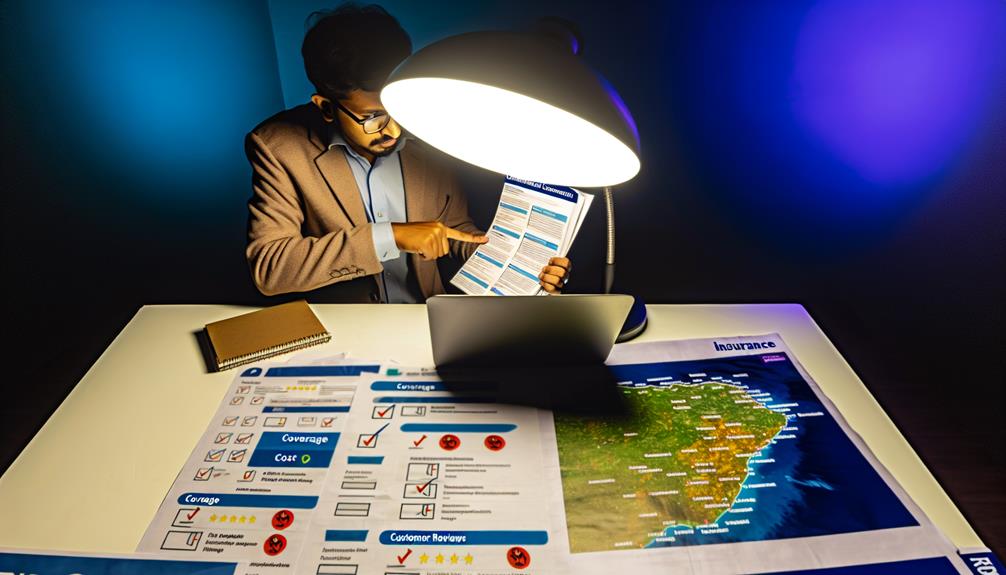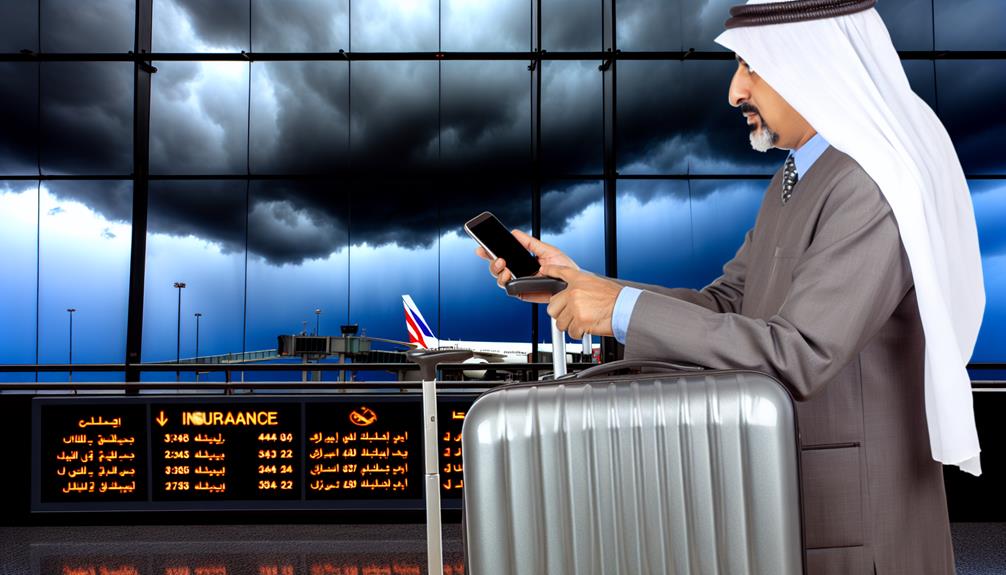To get journey insurance for weather-related delays, start by researching policies that specifically cover weather incidents. Look for plans that include trip cancellation and delay protection, ensuring they reimburse non-refundable costs like meals and accommodations. It's best to purchase insurance before severe weather forecasts are issued. Make sure the policy activates after delays of six hours or more. When delays occur, gather necessary documentation, such as proof of delay and related receipts. This preparation makes filing claims easier and more successful. There's much more you can consider to make your travel experience smoother, so keep exploring your options.
Key Takeaways
- Research and compare travel insurance providers to find plans that cover weather-related delays explicitly.
- Purchase your journey insurance before severe weather forecasts to ensure valid coverage.
- Ensure the policy includes reimbursement for meals, accommodations, and non-refundable costs due to delays.
- Review the claim process, including documentation requirements like proof of delay and receipts.
- Choose providers with a rating of A or higher for financial stability and reliable service.
Understanding Journey Insurance
When planning a trip, many travelers overlook the importance of journey insurance. Travel insurance provides essential coverage for unexpected costs, including those related to weather-related delays. If your trip gets interrupted by severe weather, you might face non-refundable costs for accommodations and meals. That's where insurance kicks in.
Understanding the terms and conditions of your policy is vital. Many plans require that the weather-related delay lasts a certain amount of time—usually six to twelve hours—before you become eligible for reimbursement. If you don't meet this duration, your insurance claim might be denied.
Additionally, some policies include assistance services that can help you rebook flights or find temporary lodging during prolonged delays. This support can be invaluable when you're stuck in an unfamiliar location.
To guarantee you're covered, purchase your journey insurance before any severe weather is forecast. If a storm is already a known peril at the time of your policy purchase, your claim could be denied later. So, take the time to understand your options, and choose a policy that best fits your travel needs, ensuring peace of mind throughout your journey.
Coverage for Weather-Related Delays
Coverage for weather-related delays can greatly ease the stress of unexpected travel disruptions. When you invest in travel insurance, you're protecting yourself against unforeseen trip costs that can arise from severe weather. Typically, this coverage kicks in if your delay exceeds a certain period, often around six hours, depending on your insurance policy.
If you find yourself facing significant delays, some travel insurance plans may even offer upfront payments for meals and accommodations. However, to file a claims request for reimbursement, you'll need to gather documentation, including proof of delay and any expenses incurred during your wait.
It's essential to review your specific policy details carefully, as the benefits and coverage limits can vary widely among different travel insurance plans. Knowing what's included in your coverage helps you understand your rights and options when delays occur. By preparing in advance and understanding your travel insurance, you can navigate weather-related delays with greater ease and confidence, ensuring that your journey remains enjoyable despite any bumps along the way.
Types of Severe Weather Covered

Severe weather can throw a wrench in your travel plans, so it's crucial to know what types are typically covered by travel insurance. Many policies include specific severe weather events like hurricanes, snowstorms, and thunderstorms as covered reasons for trip cancellation or delay coverage. Thunderstorms, in particular, are notorious for causing flight delays and cancellations across the U.S., impacting your travel schedule.
Additionally, extreme heat can affect aircraft operations, leading to potential weight reductions that might cause delays. Wildfire smoke is another severe weather condition that can impede navigation systems, resulting in substantial flight disruptions. When you purchase travel insurance, make sure it explicitly includes these types of severe weather to guarantee you're protected against non-refundable trip costs.
If your travel plans are affected by any of these weather-related travel incidents, you want to be confident that your insurance benefits will cover the unexpected inconveniences. Always read the fine print to understand how your policy addresses severe weather conditions, as this knowledge can save you a lot of stress and financial loss in the event of travel disruptions.
Airline Policies on Delays
During your travels, it's essential to understand how airlines handle delays caused by weather. In the U.S., airlines aren't legally required to compensate you for weather-related delays. Instead, they typically offer refunds or alternative flight options. If you're flying within the EU, however, regulations mandate compensation for delays over three hours unless extraordinary circumstances, like severe weather, are proven.
It's important to note that if other flights are operating on time during bad weather, you might still be eligible for compensation. Understanding these airline policies can help you navigate your rights during such disruptions.
To protect yourself against non-refundable costs due to delays, consider purchasing travel insurance. This can provide you with extra financial protection against weather-related delays, ensuring that you're covered in case of trip cancellation or other unforeseen incidents. Knowing the insurance worth in relation to your trip can save you from unexpected expenses. Remember, while airlines may have stringent policies, having travel insurance can help you feel secure and informed about your options. Always check your airline's specific policies to enhance your travel experience.
Selecting the Right Insurance Plan

Understanding airline policies sets the stage for selecting the right travel insurance plan. When choosing a plan, make certain it explicitly covers weather-related delays, as not all policies include this essential feature. A thorough travel insurance option would not only cover trip delay insurance but also provide trip cancellation benefits.
Here's a table to help you compare key aspects of different plans:
| Feature | Considerations |
|---|---|
| Coverage for Delays | Verify it covers weather-related trip delays |
| Reimbursements for Expenses | Look for plans that cover meals and lodging |
| Nonrefundable Costs | Check if it reimburses you for pre-paid costs |
| Financial Stability | Opt for providers rated A or higher by A.M. Best |
Before finalizing your choice, review the policy's terms and conditions to understand coverage limits and exclusions. Focusing on thorough plans maximizes your protection against severe weather disruptions, making certain you're covered during unexpected delays. By making an informed decision, you can enjoy peace of mind while traveling.
Claim Process for Weather Incidents
When you encounter weather-related delays while traveling, knowing how to navigate the claim process is essential for recovering your expenses. Start by reviewing your Travel Insurance plan to understand any coverage limitations regarding weather incidents. Then, gather the necessary documentation to support your claim.
Here's what you'll need:
- Proof of the delay (like a flight cancellation notice)
- Receipts for all expenses incurred (meals, hotels, transportation)
- Relevant travel itineraries to show your planned schedule
- Itemized proof of costs, detailing each expense
- A written explanation or any correspondence with the airline or service provider
Make sure to submit your claim as soon as possible. Most insurance providers have a notification timeframe, often requiring you to notify them within 30 days of the incident. Be aware that some plans may impose a waiting period for reimbursement, typically after a six to twelve-hour delay. Keeping meticulous records of everything will make the claim process smoother, ensuring you have the best chance of receiving the reimbursement you deserve.
Frequently Asked Questions
Does Travel Insurance Cover Delays Due to Weather?
Yes, travel insurance often covers delays due to weather. If your trip gets delayed for a specified duration, you could claim reimbursement for expenses like meals and accommodations. You'll need documentation proving the delay was caused by severe weather. Some policies even offer upfront payments for temporary lodging and food. Remember to review your specific policy's details, as coverage limits and exclusions can vary between providers and plans.
Can I Get Compensation for Delayed Flight Due to Weather?
You can't typically get compensation for flight delays caused by weather. U.S. airlines aren't required to pay for weather-related delays, but they must offer refunds or alternative flights. If you're traveling in the European Union, you might be eligible for compensation if your delay exceeds three hours, unless it's due to extraordinary circumstances, like severe weather. Always check your airline's policy and know your rights as a passenger.
How to Prove Flight Delay for Insurance?
To prove a flight delay for insurance, you should collect official documentation from the airline, like a delay confirmation or an email that explains the reason. Keep receipts for any extra expenses you incur, such as meals or lodging. Check your travel insurance policy for specific documentation requirements; some might need proof of delays over a certain duration. Taking screenshots of flight status updates can also serve as helpful evidence for your claim.
Can I Claim Travel Insurance if My Flight Is Delayed?
Yes, you can claim travel insurance if your flight is delayed. To do this, you'll need to provide documentation of the delay, such as notifications from the airline. Keep all receipts for any expenses you incur during the wait, like meals or accommodations. Check your policy to verify it covers flight delays, as benefits vary. If you have coverage, submit your claim promptly to get reimbursed for your additional costs.
